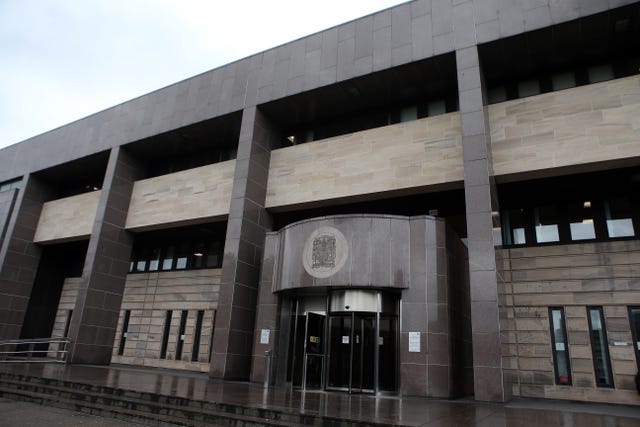Newborn baby ‘stable’ the day before dying following an infection, probe hears
Sophia Smith was just 11 days old when she died at the Royal Hospital for Children in 2017.

A newborn baby who died in a Glasgow hospital after developing an infection was “stable” the day before she passed away, an inquiry has heard.
Sophia Smith was just 11 days old when she died at the Royal Hospital for Children (RHC) at Queen Elizabeth University Hospital (QEUH) campus in Glasgow on April 11 2017.
The newborn became ill with an infection similar to MRSA, which developed into sepsis.
In 2020, Sophia’s case was handed over to the Crown Office and Procurator Fiscal Service (COPFS) which, earlier this year, announced a Fatal Accident Inquiry (FAI) into her death.
Sophia was born at the Royal Alexandra Hospital in Paisley, Renfrewshire, on March 31 2017.

The inquiry at Glasgow Sheriff Court heard that following her birth Sophia had difficulty breathing and a possible heart issue, so she was transferred to the neonatal intensive care unit (NICU) at the RHC.
There she was placed in an incubator with one-on-one nursing care and a “raft of machinery” next to her cot.
She was also given antibiotics via lines into her body, initially in her abdomen and then in her left foot.
The child “rallied” over the following days, with parents Theresa and Matthew Smith being led to believe she would be home in “a matter of weeks”.
However on April 10 Sophia’s health suddenly deteriorated and despite efforts to save her Sophia she died at 5.48pm on April 11.
Samples taken from her body on April 10 and 11 subsequently tested positive for a bacteria called staphylococcus aureus (SA), which the inquiry heard can “cause harm” if it gets into the body.
On Tuesday the inquiry heard evidence from Lorna McSeveney, a senior charge nurse who had been on duty at NICU on April 10 and 11.
The inquiry heard she carried out a routine “package of measures” at the start of her shift at 7.30am on April 10 to check on Sophia’s condition, and that these did not give her “cause for concern”.
“She was a sick baby, but she was stable,” she told the inquiry.
She took the inquiry through Sophia’s medical charts for April 10 and into April 11.
These showed, she said, that the initial signs Sophia was “not quite right” came at about 3pm.
This included changes in a number of vital signs, including her temperature, heart rate and oxygen levels, which were being constantly monitored.
Small amounts of blood were also found in her airway.
These signs continued to worsen over the ensuing hours, and she was found to be suffering from a pulmonary haemorrhage (bleeding on the lung).
When asked whether these could have been signs Sophia had sepsis, Ms McSeveney said not necessarily, since they could have been caused by other things.
She added that it was “very difficult” even for experienced staff to detect sepsis in newborn children, and that the signs of the condition could be “very subtle”.
She was also asked if there was anything she would have done anything differently in the knowledge Sophia had an infection.
She replied: “I have gone over it in my head I don’t know how many times.
“I don’t think there was.”
She said Sophia was being constantly monitored, and that from a nursing perspective she had done everything she could.
She was also asked how handwashing protocols were “policed” in NICU, with Sophia’s parents saying on Monday it was “frustrating” to see they were not always being followed by visitors and staff.
She replied that staff had a “duty” to ensure infection control measures were being followed, and that she would always challenge people if there were not complying with them.
In the afternoon, the inquiry heard evidence from Pamela Joannidis, interim associate director of infection prevention and control at the NHS Greater Glasgow and Clyde health board from 2019 to 2022.
She told the inquiry that any break in Sophia’s skin – such as from a tube – could have been a “doorway” for the SA bacteria to enter her body.
However, she said establishing the exact source of the infection was “particularly difficult”.
On Monday, the inquiry heard that no other cases of the same PVL-MSSA bacteria were found in the NICU in the six months before or after Sophia was nursed there.
Ms Joannidis was pressed by Iain Mitchell KC, representing Sophia’s parents, on whether the infection could be due to a “failure” in the ward’s hygiene protocols around the insertion of “lines”, or tubes, into patients.
“How likely is it that there can have been the infection being introduced otherwise than by a failure in the protocol of asepsis, or a failure in the protocol of prevention of a line becoming infected?” he asked.
Ms Joannidis replied that it was not possible to say for sure the infection was linked to a “device”, but said “you could not rule it out as a hypothesis”.
On Monday, Sophia’s mother Theresa Smith told the inquiry she just wanted to know what happened to her baby.
“I want to know why she is not here, playing with her brothers and sisters,” she said.
She added: “She’s dead. I live every day of my life knowing she’s dead, knowing that absolutely putrid hospital caused an infection in my child and killed her,” she said.
“And when it killed her it killed me too. I want to know what happened.”
The inquiry continues.





